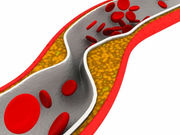Reduction in LDL-C in all subgroups, including those with, without dysglycemia and metabolic syndrome
FRIDAY, Sept. 16, 2016 (HealthDay News) — For patients with or without dysglycemia or metabolic syndrome (MetS), evolocumab is safe and efficacious for reducing low-density lipoprotein cholesterol at 52 weeks, according to research published online Sept. 13 in Diabetes, Obesity and Metabolism.
Dirk J. Blom, M.B., Ch.B., from the University of Cape Town in South Africa, and colleagues examined the lipid and glycemic effects of 52 weeks of evolocumab treatment in a post-hoc analysis of data from the DESCARTES randomized trial involving 905 patients from 88 study centers. Nine hundred one patients received at least one dose of study drug. Patients were categorized by baseline glycemic status: type 2 diabetes (120 patients), impaired fasting glucose (IFG; 293 patients), MetS (289 patients [194 also had IFG]), or none (393 patients).
The researchers found that evolocumab reduced low-density lipoprotein cholesterol by >50 percent in all subgroups at week 52, with favorable effects on other lipids. There was no significant between-group difference in any subgroup for fasting plasma glucose, hemoglobin A1c, insulin, C-peptide, or homeostasis model assessment. The overall incidence of new-onset diabetes was not significantly different for placebo and evolocumab (6.6 and 5.6 percent, respectively); the incidences were 1.9 and 2.7 percent, respectively, in those with baseline normoglycemia. The incidence of adverse events was similar between the groups.
“Evolocumab showed encouraging safety and efficacy at 52 weeks in patients with or without dysglycemia or MetS,” the authors write. “Changes in glycemic parameters did not differ between evolocumab- and placebo-treated patients within the glycemic subgroups examined.”
Several authors disclosed financial ties to pharmaceutical companies, including Amgen, which manufactures evolocumab.
Copyright © 2016 HealthDay. All rights reserved.








